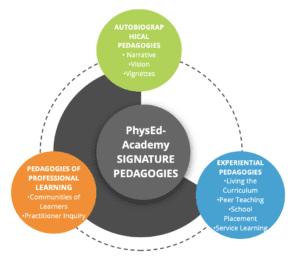Signature pedagogies are the characteristic forms of teaching by which practitioners are prepared for their future professions (Shulman, 2005). In the context of physical education teacher education and continuous professional development, they are the forms of teaching-learning that leap to mind when thinking about the preparation and continuous support of teachers in the field of PE across contexts. In recent years, scholars have pointed to the importance of identifying signature pedagogies of teacher education in PE – including both physical education teacher education and continuous professional development (O’Sullivan, 2018) to provide a foundational knowledge base and shared language from which teacher educators might choose pedagogies to best support specific teacher education outcomes (Parker et al., 2016).
In this review, 465 articles on pedagogies of teacher education in PE were reviewed through the lens of signature pedagogies (Shulman, 2005). From the pedagogies reviewed, three signature pedagogies of teacher education in PE across international contexts are identified and presented in terms of their surface, deep and implicit structure, including: (auto)biographical pedagogies, experiential pedagogies, and pedagogies of professional learning.

This study offers a preliminary shared language of teacher education pedagogies in the field of PE and is thus intended to open a dialogue on the topic. The paper highlights the balance between creating a shared language for coherence in PE teacher education and allowing flexibility in applying signature pedagogies across diverse contexts. It emphasizes the need for this shared language to guide more intentional, authentic, transformative, and equitable teacher education practices while being sensitive to local contexts and cultures.
Still have questions? Dive deeper by reading our open-access paper!
TITLE
FILE SIZE